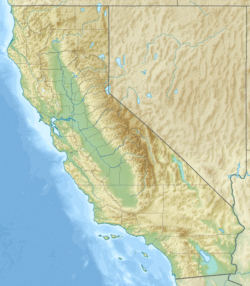Cottonwood Creek (San Luis Creek tributary) facts for kids
Quick facts for kids Cottonwood Creek |
|
|---|---|
|
Location of the mouth of Cottonwood Creek at San Luis Reservoir in California
|
|
| Other name(s) | Arroyo Alamo |
| Country | United States |
| State | California |
| Region | Merced County |
| Physical characteristics | |
| Main source | source Red Hill, eastern slope of the Diablo Range, north of Pacheco Pass, Merced County 2,080 ft (630 m) 37°07′29″N 121°11′24″W / 37.12472°N 121.19000°W |
| River mouth | mouth Confluence with San Luis Reservoir, Merced County 548 ft (167 m) 37°06′18″N 121°07′57″W / 37.10500°N 121.13250°W |
Cottonwood Creek is a small stream in California. It flows for about 4 miles (6.4 km) towards the southeast. This creek is a tributary, meaning it flows into a larger body of water.
Cottonwood Creek starts in the eastern hills of the Diablo Range. Its source is at Red Hill in Merced County. The creek originally flowed into San Luis Creek. However, after the San Luis Dam was built, Cottonwood Creek now flows into the San Luis Reservoir. This part of the reservoir is known as Cottonwood Bay.
What's in a Name?
Cottonwood Creek has an interesting history behind its name. The Spanish originally called it Arroyo Alamos. In Spanish, "Arroyo" means "creek" and "Alamos" means "cottonwood trees".
The creek was named for the many Fremont cottonwood trees that grow along its banks. Even today, you can still see lots of these trees in the area.
Wildlife and Nature
The areas around Cottonwood Creek are important for wildlife. The California Department of Fish and Wildlife (CDFW) manages two special places here. These are called the Upper and Lower Cottonwood Creek Wildlife Areas.
These wildlife areas are located near where the creek used to flow into San Luis Creek. Now, this area is part of Cottonwood Bay on the San Luis Reservoir. It's a great place to see animals.
Tule Elk in the Area
One of the most exciting animals you might spot here is the tule elk. These are large animals that look a bit like deer. A group of tule elk moved into this area between 1978 and 1981.
They came from a ranch on Mt. Hamilton in Santa Clara County. You can often see these elk from Pacheco Pass (Highway 152).
 | Stephanie Wilson |
 | Charles Bolden |
 | Ronald McNair |
 | Frederick D. Gregory |


